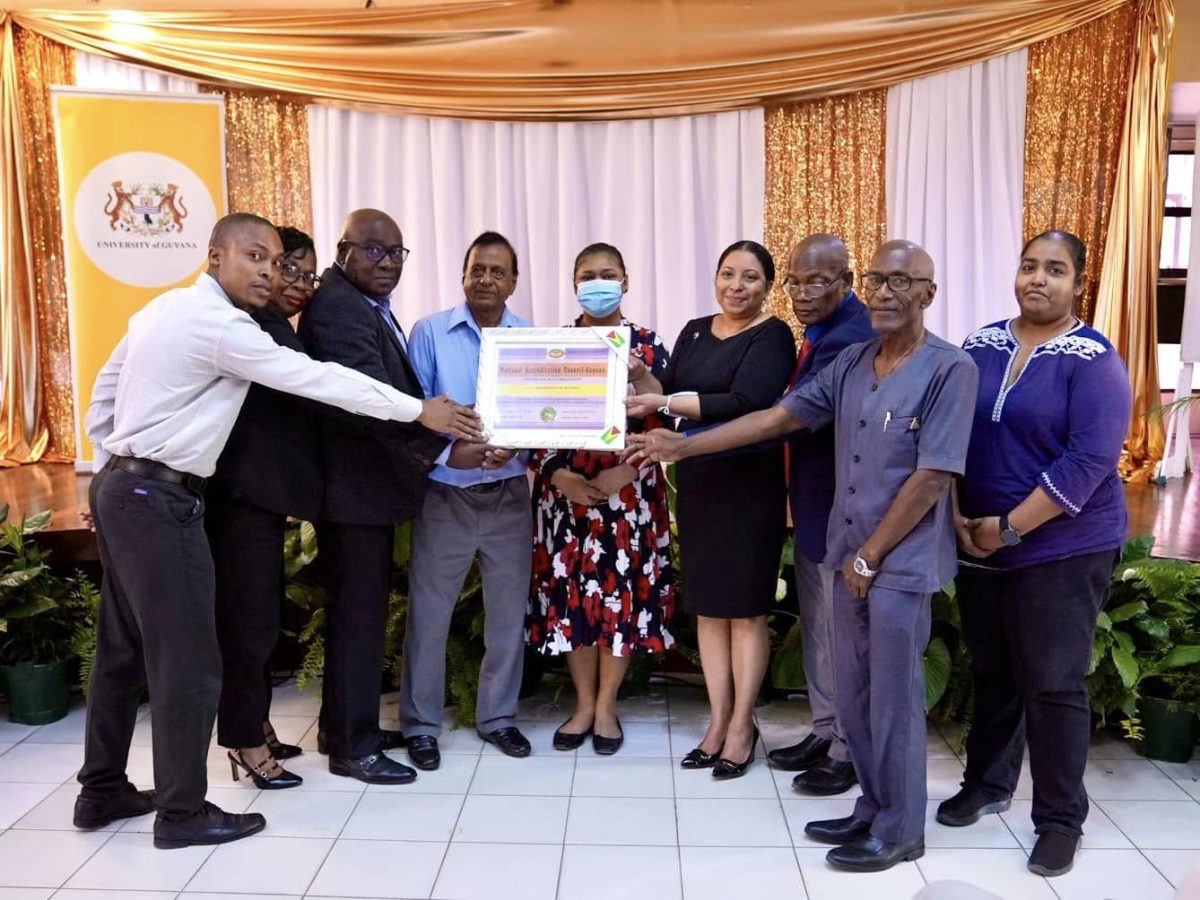The University of Guyana (UG) has attained institutional accreditation from the national body, NAC.
A release from the Ministry of Education said this was attained for the first time in its 61-year history.
While individual programmes at UG have previously earned accreditation for specific disciplines, this is the first time the entire university has met the rigorous standards required for universal institutional accreditation.
This achievement positions UG as a recognized institution for quality education, not only in Guyana but also across the region and the world, the release said.
The accreditation process was conducted by the National Accreditation Council of Guyana (NAC) and involved a comprehensive evaluation by a team of five highly credentialled international evaluators. Over a two-week period in November 2024, the team conducted a review of UG’s campuses, interviewed key stakeholders, and assessed the university’s operations and documentation. The release said that UG achieved an impressive 97% score, excelling in 16.5 of the 17 accreditation standards.
The standards met or exceeded included critical areas such as Governance and Administration, Teaching and Learning, Readiness for Change, and Quality Enhancement. The only area requiring improvement was the university’s mission statement, last reviewed in the 1970s. The evaluators recommended updating it to reflect UG’s expanded scope and forward-thinking “Blueprint 2025” strategy, which aims to elevate its academic offerings and global influence.
At a ceremony on January 21st for the handing over of the certificate, Dr. Marcel Hutson, Executive Director of NAC, spoke passionately about the significance of this achievement, stating:
“Accreditation is not merely a label or certificate; it is a robust and thorough process that affirms an institution’s capacity to provide education that meets and exceeds national and international standards. It is a commitment to quality assurance, a catalyst for self-improvement, and a guarantee of trust and confidence for students, parents, employers, and society at large.”
Dr. Hutson commended UG’s leadership and faculty for their dedication to this milestone. He emphasized that accreditation is an ongoing journey:
“Accreditation is not the final destination—it is a foundation upon which to build. It inspires innovation, continuous self-improvement, and a sustained commitment to maintaining and enhancing the standards that have been achieved. This accomplishment also strengthens UG’s ability to expand its influence regionally and globally, contributing to Guyana’s academic, cultural, and socio-economic advancement and beyond”, he said.
The accreditation is valid for five years, during which UG will focus on maintaining and enhancing the standards achieved. The university has pledged to prioritize the recommendations made by the accreditation team, including updating its mission statement to better reflect its ambitions and commitments, the release added.
In the University of Guyana release on the accreditation, Prof. Emanuel Cummings, Deputy Vice-Chancellor for Academic Engagement, whose office is responsible for academic offerings and quality control aspects of academic delivery said that the greatest benefit of accreditation is to the students, delivering among other things:
Enhanced Reputation and Credibility: Accreditation acts as a seal of approval, signalling to students, faculty, and the public that the institution meets recognised standards of quality.
Attracting and Retaining Students: Accreditation can make a university more attractive to prospective students, who often see it as an indicator of quality and value.
Access to Funding and Resources: Accreditation is often a prerequisite for universities to receive federal and state funding, as well as grants and other financial aid.
Improved Faculty Quality: Accredited institutions are more likely to attract and retain highly qualified faculty members who are drawn to the University’s commitment to excellence and its supportive.
Increased Student Employability: Graduates of accredited institutions are often viewed more favourably by employers.
UG’s Vice-Chancellor, Prof Paloma Mohamed Martin, accepted the certificate on behalf of the University and thanked all those who led and contributed to the achievement. She said that the University has risen in international rankings by over 3,000 places in the last four years due to the collaborative input of everyone.
“UG has been punching way above its weight for decades in many areas. Though we always have things to improve,” Professor Mohamed Martin said. Holding the certificate close to her heart, a tearful Vice-Chancellor said, “This is so precious and so long in coming. It’s the beginning of more hard work and a different dispensation of UG, but I am honoured to be the first Vice-Chancellor to have been involved in this process and to accept this certification on behalf of our faculty and students, our alumni and partners, and our beloved country. Students, this is for you!”, she said.










